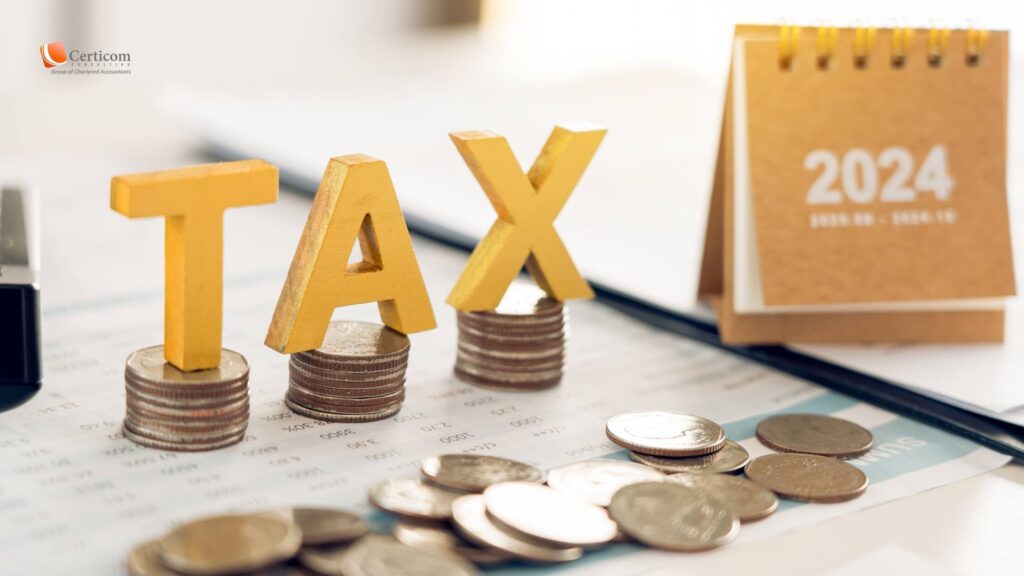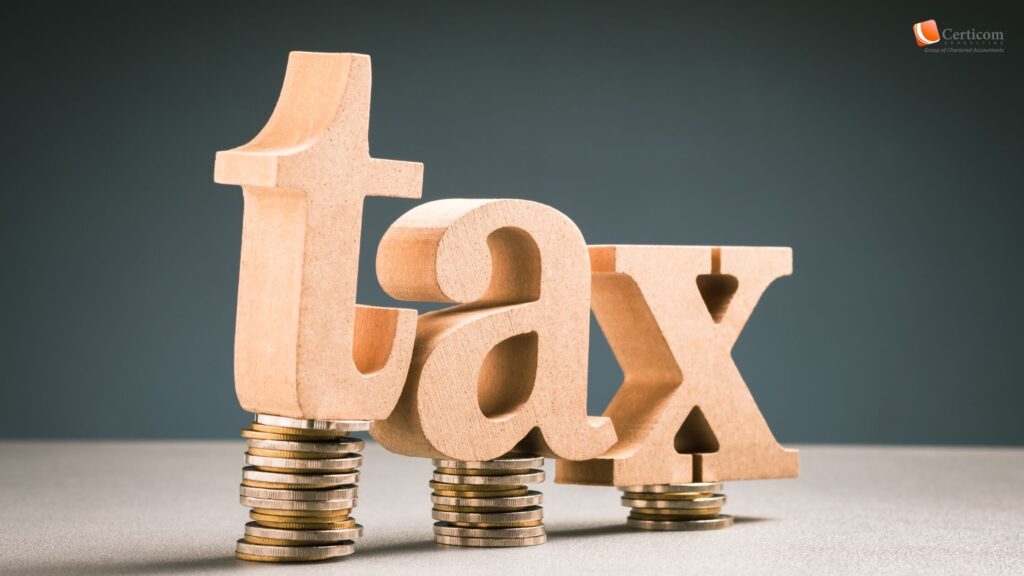Budget 2024 Key Highlights

Finance Minister Nirmala Sitharaman is presenting the Union Budget 2024-25 today, marking the first budget of Prime Minister Narendra Modi’s third term. The budget focuses on the government’s roadmap for ‘Viksit Bharat’ by 2047, emphasizing fiscal prudence, capex spending for job creation, and improving access to physical, social, and digital infrastructure.
Key Announcements on Taxes
Revised Income Tax Structure
The new income tax regime features revised tax slabs, promising a saving of ₹17,500 in income tax. The updated tax structure is as follows:
- ₹0-3 lakh: Nil
- ₹3-7 lakh: 5%
- ₹7-10 lakh: 10%
- ₹10-12 lakh: 15%
- ₹15 lakh and above: 30%
Additionally, the standard deduction for salaried individuals has been increased from ₹50,000 to ₹75,000.
TDS and TCS Announcements
Several changes have been made to the rules regarding TDS (Tax Deducted at Source) and TCS (Tax Collected at Source):
- TDS on Payments to Partners: Payments made by a firm to its partner will now be subject to TDS at 10% for aggregate amounts exceeding ₹20,000 in a financial year.
- TCS on Luxury Goods: A 1% TCS will be levied on notified luxury goods valued above ₹10 lakh.
- TDS on Floating Rate Savings Bonds (FRSB) 2020: TDS is proposed on interest exceeding ₹10,000 on FRSB 2020 or any other notified security of the Central or State Governments.

Capital Gains Tax Changes
The taxation of capital gains has been rationalized and simplified:
- Short-Term Gains Tax: On specified financial assets, the tax rate has been increased to 20% from 15%. For all other financial and non-financial assets, the applicable tax rate remains unchanged.
- Long-Term Gains Tax: Raised to 12.5% on all financial and non-financial assets.
- Exemption Limit: The limit of exemption on capital gains for certain listed financial assets has been increased from ₹1 lakh to ₹1.25 lakh per year.
- Classification of Assets:
- Listed financial assets held for more than a year will be considered long-term.
- Unlisted financial assets and all non-financial assets must be held for at least two years to qualify as long-term.
- Unlisted Bonds and Debentures: Unlisted bonds and debentures, debt mutual funds, and market-linked debentures will attract capital gains tax at applicable rates regardless of the holding period.
MSMEs and Loans
- MSMEs:
- New mechanism for bank credit continuation during stress periods.
- Mudra loan limit increased from ₹10 lakh to ₹20 lakh.
- Turnover threshold for mandatory onboarding on TReDS platform reduced from ₹500 crore to ₹250 crore.
- Financial support for 50 multi-product food irradiation units.
- E-Commerce Export Hubs to be set up in PPP mode.
Customs Duties
- Gold and Silver: Duties cut to 6%.
- Platinum: Duty cut to 6.4%.
- Lithium, Copper, Cobalt: Exempted from customs duty.
- Solar Manufacturing: Expanded list of exempted capital goods used in manufacturing solar cells and panels.
- Spandex Yarn: BCD reduced from 7.5% to 5%.
- Connectors and Oxygen-Fused Copper: Exempted from customs duty.
Fiscal Deficit and Expenditure
- FY25 Fiscal Deficit: Projected at 4.9% of GDP, down from 5.1% in the Interim Budget.
- Expenditure: Set at ₹48.21 lakh crore.
- Receipts: Estimated at ₹32.07 lakh crore.
- Capex for FY25: Maintained at ₹11.11 lakh crore, or 3.4% of GDP.
Industrial Development
- Industrial Parks: Investment-ready “plug and play” industrial parks to be developed in or near 100 cities.
- National Industrial Corridor Development Programme: 12 industrial parks sanctioned.
- Critical Mineral Mission: To be established for domestic production, recycling, and overseas acquisition of critical minerals.
Skilling and Employment
- Skilling Programme:
- 1,000 ITIs to be upgraded in a hub & spoke model over 5 years.
- Focus on outcomes and quality in collaboration with states and industry.
- Internship Program:
- 1 crore youth to be skilled by top companies over five years.
- 12-month Prime Minister’s Internship with a monthly allowance of ₹5,000.
Education and Skill Development
- Model Skill Loan Scheme: Revised to facilitate loans up to ₹7.5 lakh with a government-promoted fund guarantee, expected to help 25,000 students annually.
- Higher Education Loans: E-vouchers for loans up to ₹10 lakh for domestic higher education, benefiting 1 lakh students annually with a 3% interest subvention.
Employment Linked Incentives
- Three Schemes Announced:
- Scheme A: First-time employees receive one month’s wage via direct benefit transfer, up to ₹15,000, in three instalments.
- Scheme B: Incentives for job creation in the manufacturing sector linked to EPFO contributions for first-time employees.
- Scheme C: Employers reimbursed up to ₹3,000 per month for 2 years towards EPFO contributions for each additional employee, with a salary eligibility limit of ₹1 lakh per month.
Agriculture Sector
- Funding and Initiatives:
- ₹1.52 lakh crore allocated for agriculture and allied sectors.
- 10,000 bio research centres to be established.
- 1 crore farmers to be initiated into natural farming with branding and certification support.
- Development of large vegetable production and supply chain clusters near consumption centres.
- Financial support for shrimp breeding centres, facilitated exports through NABARD.
- Kisan Credit Cards to be launched in five states.
- Release of 109 varieties of 32 crops.
- Verification and branding support for natural farmers.
- Inclusion of 6 crore farmers and their land in the farmer and land registry.
Tax Reductions for Foreign Companies
- Income Tax Rate: Reduced from 40% to 35% for foreign companies, except for those chargeable at special rates.

Tax on Share Buyback and STT on F&O Transactions
- Share Buyback: Income from buy-back of shares to be treated as dividend in the hands of the investor, with the cost of shares considered as a capital loss.
- Securities Transaction Tax (STT):
- Sale of options: Increased from 0.0625% to 0.1% of the option premium.
- Sale of futures: Increased from 0.0125% to 0.02% of the traded price.
Incentives for IFSC
- Retail Schemes and ETFs: Tax exemptions similar to those available to specified funds.
- Core Settlement Guarantee Fund: Certain incomes exempted from tax.
- Section 94B Exclusion: Not applicable to specific finance companies in IFSC.
- Venture Capital Funds: No requirement to explain the source of funds for loans extended by VCFs in IFSC.
- Surcharge Exemption: Not applicable on income tax payable on income from securities by specified funds.
Sector-Specific Customs Duty Changes
- Mobile Phones and Accessories: Basic Custom Duty (BCD) cut to 15% for mobile phones, mobile PCBAs, and chargers.
- Critical Minerals: Customs duties on 25 critical minerals for sectors like nuclear energy, renewable energy, space, defense, telecommunications, and high-tech electronics are fully exempted, with BCD reduced on two of them.
- Shrimp and Fish Feed: BCD reduced to 5% on certain broodstock, polychaete worms, and feed; customs duty on various inputs for their manufacture has been exempted.
- Down Filling Material: BCD reduced on real down filling material from duck or goose.
- Precious Metals: Customs duties on gold and silver reduced to 6%, platinum to 6.4%.
- Other Metals:
- Ferro nickel and blister copper: BCD removed.
- Oxygen-free copper for resistor manufacturing: BCD removed.
- Ammonium nitrate: BCD reduced from 7.5% to 5%.
- Aviation and Ship Repairs: Export period for goods imported for repairs extended from 6 months to 1 year.
Related Post
A Beginner’s Guide to E-Filing Income Tax Return for FY 2024-25
Faking Tax Deductions? You Could Be Penalised Up To 200% Under Income Tax Rules
Book A One To One Consultation Now For FREE
How can we help? *




